In the competitive landscape of e-commerce, your e-store's visibility can make or break your success. To gain an edge and attract organic traffic, you need to harness the potential of Meta Titles, Meta Descriptions, and Keywords. These essential elements can help supercharge your e-store's performance.
Learn More About SEO
1. Meta Titles
Meta Titles are concise and descriptive titles that summarize the content of a webpage. They play a crucial role in search engine results and browser tabs, influencing users' decisions to click on your e-store link. It also appears as the headline in search engine results.
Craft a well-optimized title that contains relevant keywords related to your business or the specific page's content.
Ensure the title falls within the recommended character limit, which is typically between 50 to 60 characters.
Make the title engaging and relevant to entice users to click on your listing in search results.
2. Meta Descriptions
Meta Descriptions are short summaries that provide additional context about a webpage's content. Like Meta Titles, they appear in search results and can sway users to visit your e-store. To create an effective meta description: Craft a concise and informative description that complements the meta title. Include relevant keywords naturally within the description.
3. Keywords
Keywords are specific words or phrases related to your e-store's products or services. They're strategically placed within your content to improve your e-store's search engine ranking.
How Can They Benefit Your E-Store?
- Enhanced Search Engine Rankings
Optimized Meta Titles and Descriptions can significantly boost your e-store's search engine ranking. Higher rankings mean more visibility to potential customers, increasing the chances of attracting organic traffic. - Improved Click-Through Rates (CTR)
Compelling Meta Titles and Descriptions serve as digital advertisements for your e-store. They entice users to click on your link when it appears in search results. Crafting engaging meta content can increase your CTR and drive more traffic. - Increased Organic Traffic
Organic traffic, the most valuable type of web traffic, comes from users actively searching for products or services. Optimized Meta Titles and Descriptions can capture the attention of these users, leading to higher organic traffic.
Creating Effective Meta Titles and Descriptions
- Conciseness and Relevance: Keep your Meta Titles and Descriptions concise while accurately representing the page's content. Avoid keyword stuffing and focus on delivering value to users.
- Keyword Integration: Strategically include relevant keywords in your Meta Titles and Descriptions. These keywords should align with what potential customers are searching for.
- Call to Action (CTA): Encourage users to take action by adding a compelling CTA in your Meta Descriptions. Phrases like "Shop now," "Learn more," or "Discover exclusive deals" can motivate users to click.
- Highlight Unique Selling Points: Use Meta Descriptions to showcase your e-store's unique selling points. What sets your e-store apart from the competition? Highlight these qualities to pique users' interest.
Next, implement these keywords strategically in your Meta Titles and Descriptions. Craft them in a way that pleases search engines while engaging and informing potential customers.
FAQs
1. What is the importance of meta title and meta description?
Meta titles and descriptions play a crucial role in SEO (Search Engine Optimization). They provide concise information about the content of a web page and help search engines understand and rank your site accurately. Additionally, they serve as the first impression for users when they come across your site in search results, influencing click-through rates.
2. How long does it take for the titles and descriptions to be reflected on Google and produce results?
The time it takes for Google to reflect changes in your meta titles and descriptions can vary. Generally, if your website is well-optimized and regularly crawled by search engines, you can expect to see results within two to four weeks. However, it's important to note that SEO is an ongoing process, and it may take some time to see significant improvements in rankings and traffic.
3. What can be done to expedite the reflection of meta titles and descriptions on Google?
To speed up the process, ensure your website is well-optimized overall. This includes having high-quality content, using relevant keywords, and following SEO best practices. Generating consistent traffic to your site and having a substantial number of pages can also help. Additionally, using a unique template for products within the same category can enhance indexing and ranking for those products. Remember that SEO is a continuous effort, and patience is key to long-term success.
4. Are there any character limits for meta titles and descriptions?
Yes, there are character limits to keep in mind. For meta titles, it's generally recommended to keep them between 50 to 60 characters to ensure they display correctly in search engine results. Meta descriptions should ideally fall within the range of 150 to 160 characters for optimal visibility and clarity.
5. Can I change my meta titles and descriptions frequently, or is it better to keep them stable?
It's advisable to strike a balance. While it's perfectly acceptable to update your meta titles and descriptions when necessary to reflect changes in your content or marketing strategy, frequent changes without a clear reason can confuse search engines. It's essential to maintain consistency and relevance in your meta tags to provide a better user experience and maintain SEO rankings.
6. Do meta titles and descriptions directly impact my website's search engine ranking?
Meta titles and descriptions are essential for search engines to understand your content and improve click-through rates. While they are not the sole factor influencing search engine ranking, they play a significant indirect role. By creating compelling and keyword-optimized meta tags, you increase the likelihood of attracting more organic traffic, which can positively impact your overall ranking over time.
1. Click My Store

2. Click Settings

3. Click Store Settings
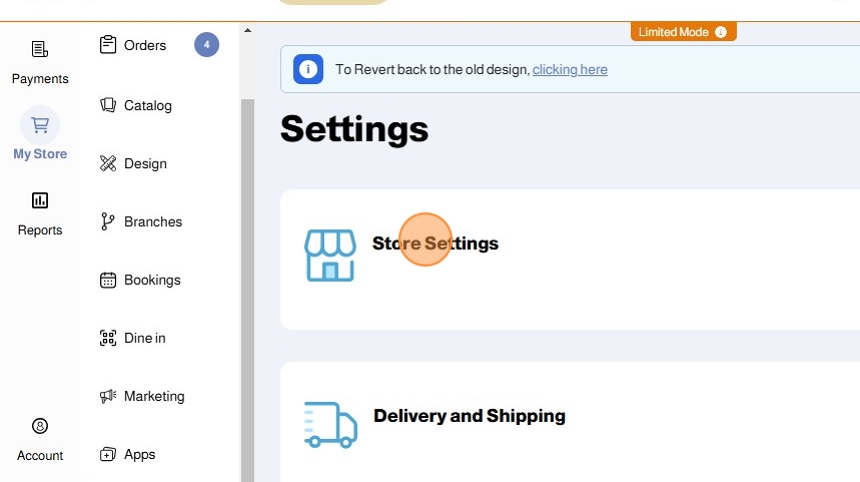
4. Click SEO
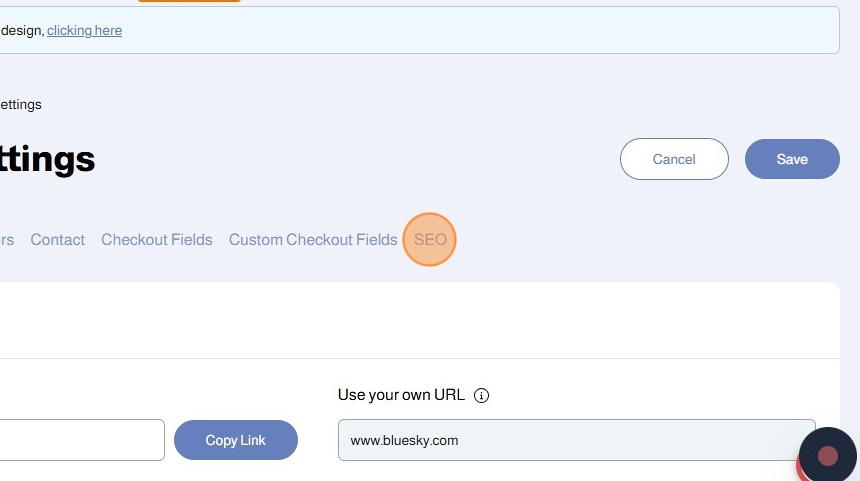
5. Enter your Page Title

6. Enter your Meta Description
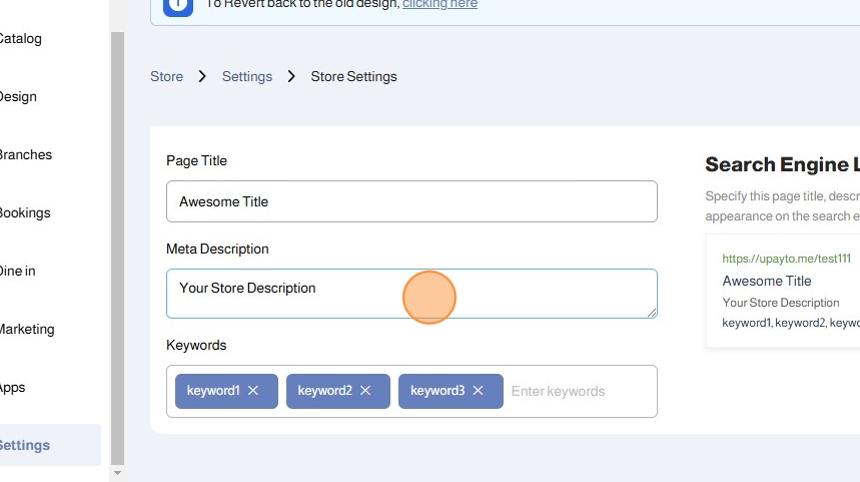
Tip: For Meta Titles and Description, there are character limits to keep in mind. For meta titles, it's generally recommended to keep them between 50 to 60 characters to ensure they display correctly in search engine results. Meta descriptions should ideally fall within the range of 150 to 160 characters for optimal visibility and clarity.
7. Enter your Keywords by typing them and separating them with commas "," or by pressing [[Enter]] after each keyword
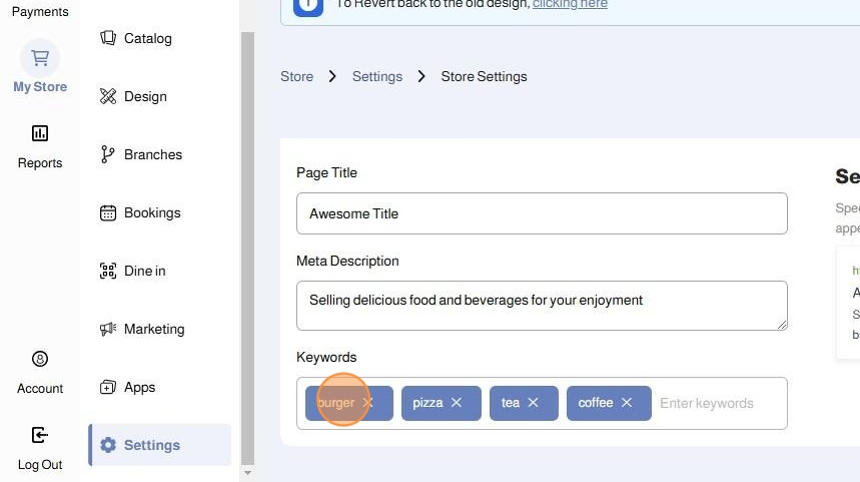
8. Preview your SEO settings on the right demonstration area
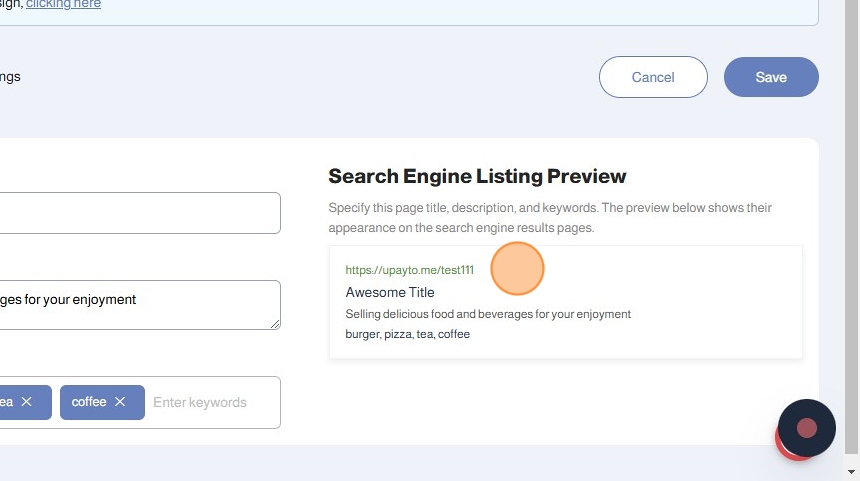
Alert: Keywords are shown for demonstration purposes. Keywords do not appear visibly on the search engine results and instead they are seen by the search engine itself
9. Click Save

Alert: The time it takes for Google to reflect changes in your meta titles and descriptions can vary. Generally, if your website is well-optimized and regularly crawled by search engines, you can expect to see results within two to four weeks. However, it's important to note that SEO is an ongoing process, and it may take some time to see significant improvements in rankings and traffic.
Was this article helpful?
That’s Great!
Thank you for your feedback
Sorry! We couldn't be helpful
Thank you for your feedback
Feedback sent
We appreciate your effort and will try to fix the article